
World Cup Diary Pt. 3.5: The Anjas and the Tanjas and the end of the road for the U.S.
 Once again it is time to put the focus on the most important football tournament of the planet. Since we had to present Matty´s kind apology right away, this time around only two of our experts have their say. Derek reviews the U.S. performance in South Africa after the defeat against Ghana in overtime. And schwatzgelb.com´s own Steph chose to retreat to the East German lakes to meditate about the German chances in tomorrows clash against Argentina and the multi-cultural background of ze Mannschaft.
Once again it is time to put the focus on the most important football tournament of the planet. Since we had to present Matty´s kind apology right away, this time around only two of our experts have their say. Derek reviews the U.S. performance in South Africa after the defeat against Ghana in overtime. And schwatzgelb.com´s own Steph chose to retreat to the East German lakes to meditate about the German chances in tomorrows clash against Argentina and the multi-cultural background of ze Mannschaft.
Derek from the U.S.A.
Writing a post-mortem for the US after the first knockout round is not at all unexpected. The means by which the team met their end, however -- a 2-1 loss to Ghana, the same team that squelched US hopes in 2006 -- was. That disparity -- that the team did as well as expected, but also missed a golden opportunity to advance, defines this World Cup experience for US fans. The team was at times brilliant, but only in escaping traps it set for itself. It lost to a team it could have -- perhaps should have -- beaten, and missed a chance at Uruguay, another lower-ranked team. These games would not have been easy, of course, but it was a path to the semi-finals that would have been about as navigable as one will ever see -- no Germany, Argentina, Brazil, Spain, or Netherlands until that point.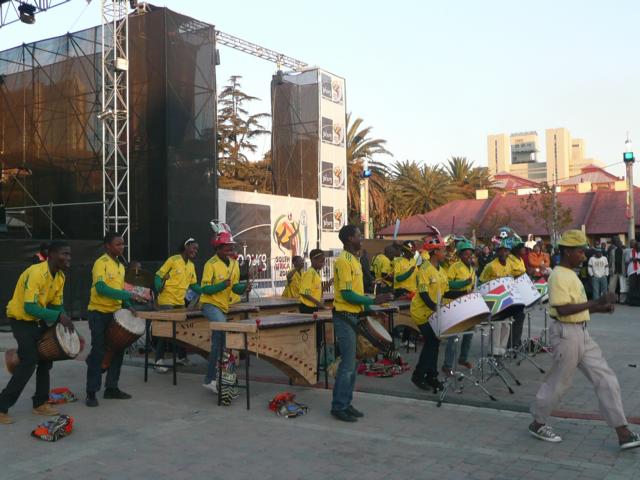
But fans of the US team who had followed them through qualifying rounds knew that they could be frustrating and mercurial at times. Yes, there was a 2-0 win over Spain in the Confederations Cup, but there was also a loss to Costa Rica during qualifying; an early goal ceded at home against El Salvador, necessitating a comeback win; a narrow, last minute victory at Trinidad & Tobago in an evenly played match; subsequent injuries to our top striker, Charlie Davies (involved in a horrific car crash that eventually took him out of the running for the team) and Oguchi Onyewu (knee injury in the game the day after Davies' crash that severely limited his training and ruined his season for Milan) had weakened the side. They won the group, but did so in a very shaky manner, and largely because Mexico endured its own spell of underachievement that at one point threatened its qualification. These issues, along with a back line horribly exposed in pre-tournament friendlies, led to some hand-wringing among US fans. My own pre-World Cup prediction was that they would struggle to get out of the group stage. Troublingly, the team had a frustrating tendency to give up early goals.
Fast forward to the World Cup: 4'. 12'. 5'. Those are the times at which the US's opponents scored in three of their four World Cup games -- the trend continued. In the first two cases, against England and Slovenia, the team battled back for draws, and did so in a manner that led many to react to the draws as victories. In the latter match, against Ghana, the team battled back, but only so far (and, it deserves to be mentioned, Ghana's second, winning goal was scored in the third minute of extra time.) It is very difficult to win at the level of the World Cup yielding goals that early that consistently.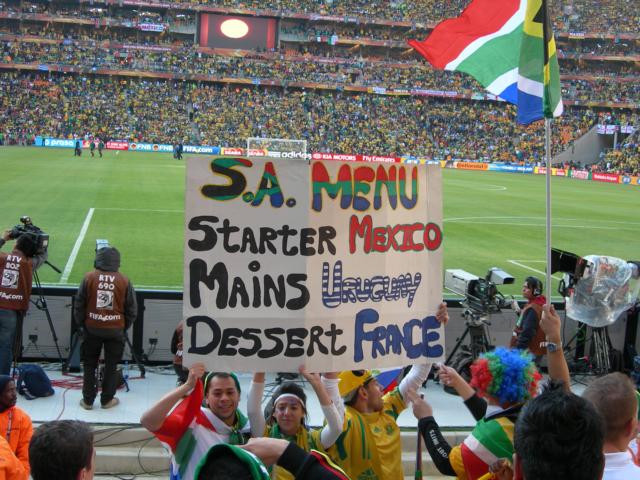
On the positive side, the US team demonstrated its spirit and tenacity and won many admirers overseas. As mentioned, three of the midfielders -- Dempsey, Donovan, and coach's son Bradley -- played extremely well. Hannover's Steve Cherundolo also had an excellent Cup, and Tim Howard was solid, although after England, he was unable to rescue his teammates. The ferocious comeback against Slovenia showed how dominating the team could be when united in purpose. The win against Algeria showed steel, and Donovan's goal was one of the Cup's most exciting moments thus far. However poorly England performed later in the tournament, it was a strong contender coming into the tournament, and the US battled it to a draw that likely contributed greatly to the team's fractious demise. And, although England's failure against Algeria is largely to blame, the US did manage to win the group on goals scored. Although the path it took was sloppy and circuitous, the team did what its world ranking suggested it would, and acquitted itself well.
A quick word about England's "fractious demise." As many may be aware, the US has a tendency to analyze its sports like economists picking apart a market. Baseball, in particular, is reduced to reams of spreadsheets. This statistical bent tends to lead fans and followers to downplay the psychological aspect of sport (wrongly, in my opinion,) concentrating instead on supposedly innate tendencies of players performing consistently in similar conditions. In soccer, however, which is more difficult to parse mathematically, the role of psychology cannot be underestimated. The immense, astonishing pressure under which the England team operates is miles beyond anything the US players experience at home. The Robert Green flub against the US, the draw against Algeria, and the on-field leadership vacuum must have created a veritable timebomb. When Lampard's goal was unjustly disallowed, the team collapsed.
Similarly, when Landon Donovan was in tears after his winning goal against Algeria and talking about four years of hard work rewarded, one could sense that the team may have reached its peak at that point. After the emotional and physical exhaustion expended just disposing of Algeria and Slovenia, one could perhaps count on a letdown against Ghana.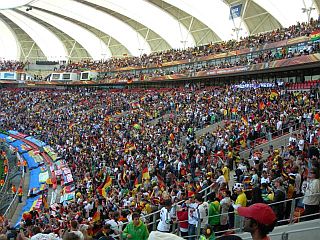 One final observation is one of admiration for Joachim Löw. Of course, he seems to have unjustly left Hummels off of the squad, but it is difficult to argue with the philosophy of selection that credits performance for and on-field cohesiveness of the team over simply taking the individuals having had the best performances. As US basketball fans are well aware, the "team of stars" has great difficultly sorting itself out at times. (The US soccer team, filled with players who often take supporting roles with their own clubs, has no such difficulty.) Teams like England, Germany, and Brazil likely could each field several teams as strong or stronger than the US. The temptation is simply to take the most talented players, regardless of how they mesh on the field. Of course, a coach selecting the "best" players can be criticized, but not for selection. A coach who leaves players at home and loses, however, may be savaged in the press. Loew (commendably) did not bow to pressure to select, for example, Kuranyi, and instead took the risk of going with the team he preferred. Dunga, with Brazil, had a similar view. (One would think, after 2006, that the Italians would have learned the same.) Those teams are reaping the benefits.
One final observation is one of admiration for Joachim Löw. Of course, he seems to have unjustly left Hummels off of the squad, but it is difficult to argue with the philosophy of selection that credits performance for and on-field cohesiveness of the team over simply taking the individuals having had the best performances. As US basketball fans are well aware, the "team of stars" has great difficultly sorting itself out at times. (The US soccer team, filled with players who often take supporting roles with their own clubs, has no such difficulty.) Teams like England, Germany, and Brazil likely could each field several teams as strong or stronger than the US. The temptation is simply to take the most talented players, regardless of how they mesh on the field. Of course, a coach selecting the "best" players can be criticized, but not for selection. A coach who leaves players at home and loses, however, may be savaged in the press. Loew (commendably) did not bow to pressure to select, for example, Kuranyi, and instead took the risk of going with the team he preferred. Dunga, with Brazil, had a similar view. (One would think, after 2006, that the Italians would have learned the same.) Those teams are reaping the benefits.
Steph from schwatzgelb.com, hermit at the Polish border
In 2002 Turkey had an amazing run in the World Cup, they went past the group stages, beat Japan in the second round and faced Senegal in the Quarters. Until then they had never done any good on such a big level. Fascination for the team grew and with every win there was a new phenomenon to be seen on the streets of Germany. After every win cars would jam on the streets, they carried flags, of course most of them were Turkish. It was loud, people were hanging out of their cars, shouting and screaming. You'd hear horns everywhere and there was no Turkish wedding to be seen anywhere. It was only a game. And Turkey advanced, they scored a Golden Goal against Senegal and suddenly faced Brazil in the Semi s. They never won that match but something had changed. Germany lost to Brazil in the final. They had a team nobody had ever seen close to the World Cup Final, the team with the likes of Carsten Ramelow, Jens Jeremies, Jens Nowotny and Carsten Jancker however lived up to what the foreign press thought of ze Germans. They were Panzer destroying the hopes of Paraguay, the USA and South Korea with precision. They had King Khan in goal who went on to become a legend in Asia and loose the Final for Germany. I have already written about our team this year - a bunch of players with different ethnic background. The closest the 2002 team had was Oliver Neuville, a Swiss born son of a German father and an Italian mother. His granddad was a citizen of Belgium. This team and the final against Brazil however inspired a nation to meet on the street afterwards and do as the Turkish do. They celebrated the unexpected success of Le Mannschaft. The Kudamm in Berlin was overflowing with people from Turkey and Germany, they did not only mingle but both celebrated their respective team and the other team. Cars flooded the streets, this time sporting German flags and Turkish flags.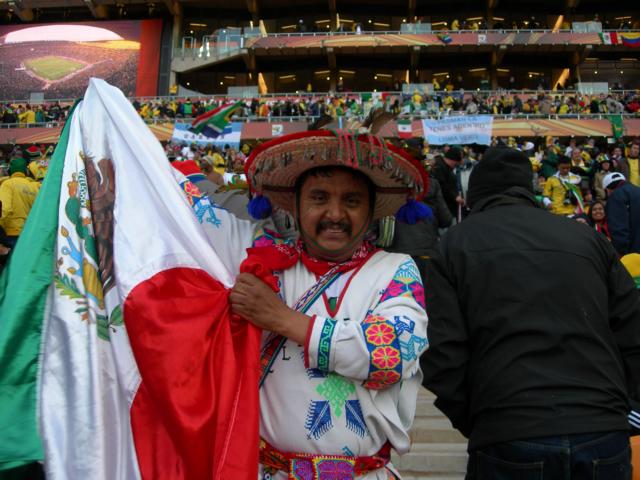
Another four years have passed since. It is summer again, Germany is on a hot streak, people go out and celebrate the team, the game and the World Cup. This time not a lot of foreigners from other countries show up. But remember the German team and what it stands for. It stands for a new German society. There are a lot of other ethnics groups on those Public Viewing squares all over the republic. They sport black/red/gold, they wear bikinis and trunks. It is summer again, football is still sexy, the World Cup is sexy. Everyone talks football, cars have flags attached to the roofs, weirdos carry Vuvuzelas and a few of them even know how to use them. Amongst them you will also find the one or the other football fan. But again a bunch of them said Goodbye to Germany and its team. They either started supporting other teams. "I am pro football and want the best team to win it." The best team has to play in fashion, has to play a 100% all of the time, has to play the beautiful game. Others abandon World Cup altogether and say football played a club level is the only game they allow. Of course this game is restricted again to their standards, they have been reclaiming the game for some time. What ties all groups together is there hate for the "Anjas & Tanjas" (that's how the so-called event fans are labeled these days), they despise cars jamming the streets and Vuvuzelas. They are a bunch of miserable people.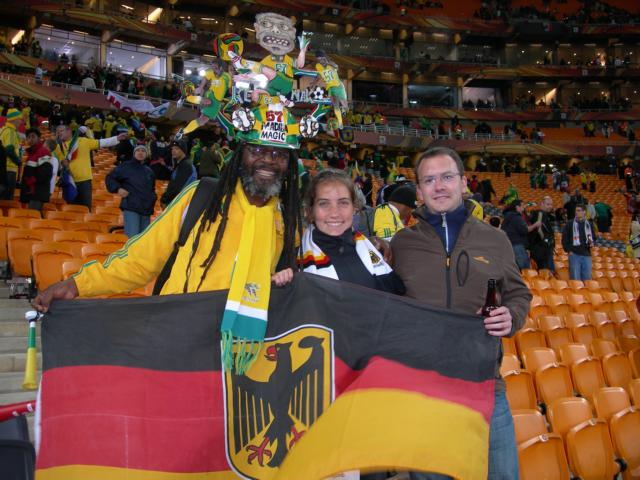
And history will repeat itself. A young and fresh German team will take Messi out, Mertesacker and Friedrich will deny Higuain and Tevez and Demichelis shall help Le Mannschaft upfront. Catch me celebrating on the streets afterwards, I'll be sporting my Deutschland top and maybe even be painted in Black/Red/Gold, shaking hands with people from all over the world. They all live in a new Germany.
That´s all for today. We´ll be back with more after the quarter finals. Remember that the guest authors express their own opinions, which must not necessarily correspond to the view of the editors of schwatzgelb.com.
web 02.07.2010
Weitere Artikel




